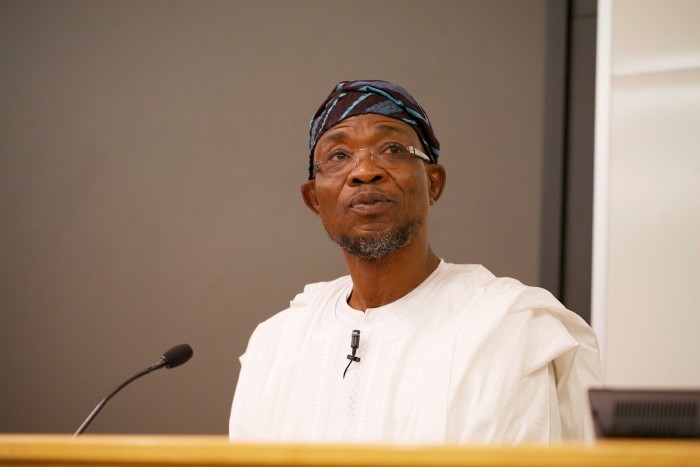
NJC Sacks Osun Judge
Justice Olamide Folahanmi Oloyede, of the High Court in the state of Osun has been recommended for compulsory retirement by the National Judicial Council (NJC).

The council also stated that Justice Mohammed Nasiru Yunusa of the Federal High Court, Lagos Division, has been kicked out of the bench for alleged misconduct.
The council said pending the time President Muhammadu Buhari and Aregbesola confirm the compulsory retirement, the NJC, in the exercise of its disciplinary powers under the constitution has suspended the two judges.
A statement issued yesterday in Abuja by the council’s acting Director of Information, Mr Soji Oye, said: “The council under the chairmanship of the Hon. Chief Justice of Nigeria, Hon. Justice Mahmud Mohammed at its 77th meeting which was held on 15th July, 2016 recommended the compulsory retirement from office of Hon. Justice Mohammed Nasiru Yunusa of the Federal High Court of the Lagos Division and Hon. Justice Olamide Folahanmi Oloyede of the High Court of Justice, Osun State.
“Justice Yunusa was recommended for compulsory retirement from office to President Muhammadu Buhari pursuant to the findings by the council following the allegations contained in petitions written against him by the Civil Society Network Against Corruption that His Lordship granted interim orders and perpetual injunctions, restraining the Attorney-General of the Federation, the Inspector General of Police, the Independent Corruption Practices and Related Offence Commission (ICPC) and the Economic and Financial Crimes Commission (EFCC) from arresting, investigating and prosecuting some persons accused of corruption in the following seven cases: FHCLCS14712015: between Simon John Adonimere & 3 Ors Vs. EFCC; FHCLCS47714: FRN V Michael Adenuga; FHCLCS134215: Senator Stella Oduah Vs. AG Federation, EFCC, ICPC & IGP; FHCLCS128515: Jyde Adelakun & Anor Vs. Chairman EFCC & Anor; FHCLCS1455: Dr. Martins Oluwafemi Thomas Vs. EFCC; FHCLCS126915: Hon Shamsudeen Abogu Vs. EFCC & Ors; and FHCLCS101215: Hon. Etete Dauzia Loya Vs. EFCC.”
The statement said that during deliberations, council found as follows: “That Justice Yunusa assumed jurisdiction in the Federal High Court, Lagos, in suit FHCLCS134215 wherein the infringement of the applicant’s rights occurred in Abuja contrary to Section 46 (1) of the 1999 Constitution of Nigeria (as amended).
“That His Lordship contravened Rule 3.1 of the Code of Conduct for Judicial Officers in Suit FHCLCS144515 by claiming ignorance of the provisions of the Money Laundering Act when he made an order stopping EFCC from carrying out an investigation into a money laundering case involving $2.2 million against the applicant.
“That Hon. Justice Yunusa’s decision restraining the anti-graft agencies from carrying out their statutory functions in the first six cases mentioned is contrary to the judgment of the Court of Appeal in A.G Anambra State Vs. UBA which His Lordship quoted but did not apply in his rulings.”
On the allegations levelled against Justice Oloyede by a group, Osun Civil Societies Coalition, the council also recommended her compulsory retirement from office to the Osun governor sequel to the findings of its fact-finding committee that: “The judge failed to conduct herself in such a manner as to preserve the dignity of her office and the impartiality and independence of the judiciary when she wrote a petition against the Osun State governor and his deputy to the members of the state House of Assembly and circulated same to 36 persons/organisations.
“The petition written by the judge was said to contain political statements, unsubstantiated allegations and accusations aimed at deriding, demeaning and undermining the government of Osun State, the person and character of the governor (as one who is cruel, a liar and a traitor), his deputy and aides.
“The council also found that the petition contained statements calculated to incite the residents of Osun State against the state government and its elected officers.”
NJC added: “Justice Oloyede crossed the fundamental right of freedom of speech and created a negative perception of the Nigerian judiciary to the public.
“The allegations against the judge constitute a misconduct contrary to Section 292(1) (b) of the 1999 Constitution of the Federal Republic of Nigeria, as amended and Rules 1(1) and 5 of the 2016 Revised Code of Conduct for Judicial Officers of the Federal Republic of Nigeria.”



